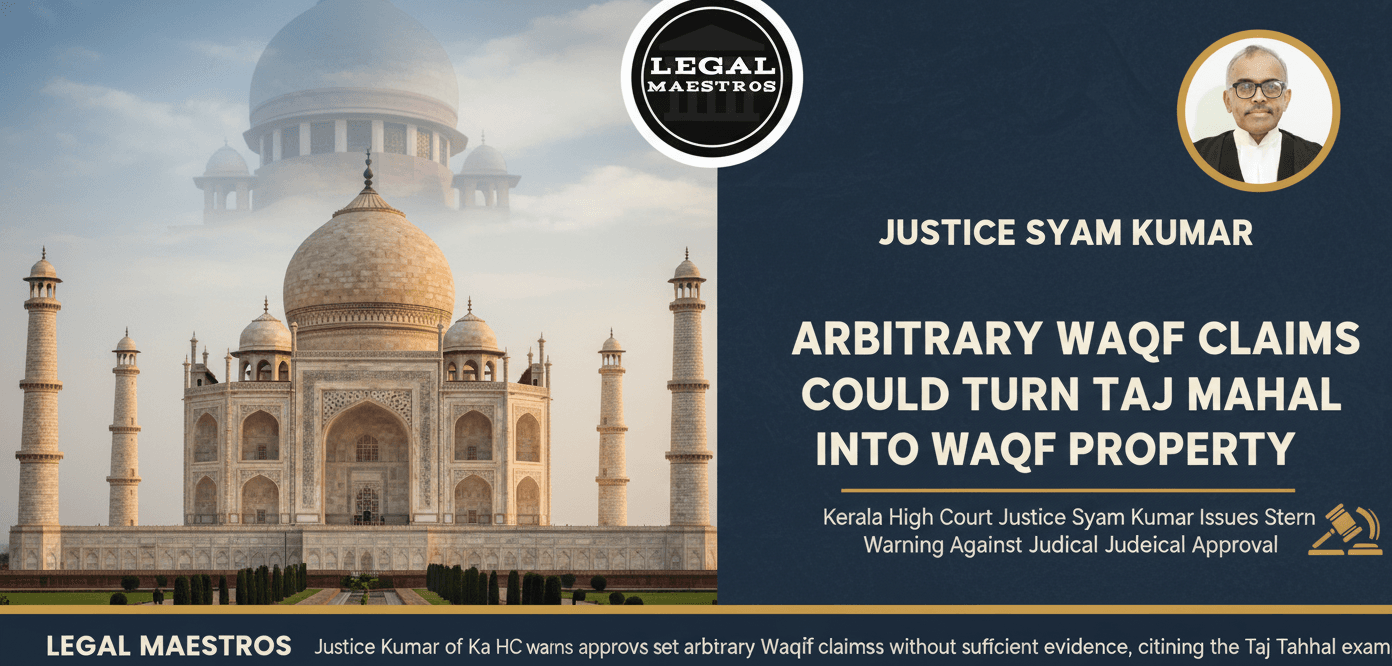
Justice Syam Kumar of Kerala High Court Warns Judicial Approval of Arbitrary Waqf Claims Could Turn Taj Mahal into Waqf Property
A Call for Caution and Clarity
The meaning of the statement made by justice Syam Kumar did not imply alarm and was a deep-seated appeal to hard work in the judiciary. His phrases demonstrate that he has a great concern with the rule of law and preservation of the property rights of all citizens. This was observed in one of the cases referred to which a judge stressed that the legal process should be followed with care and integrity.
Such an example as Taj Mahal was a carefully designed and effective rhetorical device. The Justice demonstrated the absurdity and perils of believing claims without sufficient evidence and a trial process by selecting a monument of such national and international significance. By saying so, he meant that when the basic principles of the law are overlooked, no property, however strong a claim to it, is really safe against ad hoc claims.
This fact highlights the great burden that is placed on the shoulders of the judiciary. It is a warning that courts are the ultimate protectors of justice and they should serve as a countercheck to any possible overreaching of administrative and quasi-judicial bodies. Such is an opinion that must afford us all a feeling of safety and optimism in our justice system.
For any queries or to publish an article or post or advertisement on our platform, do call at +91 6377460764 or email us at contact@legalmaestros.com.
Understanding the Heart of Waqf Law
In order to fully enjoy the heaviness of this statement, it is worthwhile to know what Waqf is. Simply put, under Mohammedan Law, Waqf refers to the perpetual endowment of any property by an individual professing to be Muslim to any purpose that is known under the provisions of the Muslim law as pious, religious or charitable. When a property is declared Waqf, it becomes the property of God and it cannot be sold or mortgaged and even alienated. Waqf Boards control these properties.
Waqf properties are given a special status and the cases concerning it are generally processed in certain tribunals. The legal issues and controversy usually ensue when a Waqf Board claims a piece of property which has been privately owned over generations. The board can argue that the property was devoted as Waqf centuries ago and it resulted in the legal disputes which involve legal battles over the historical documents and property ownership.
It is in this delicate and usually controversial background that the warning of Justice Kumar echoes so well. He is arguing in favor of a middle ground, in which the noble cause of Waqf should be observed, but not to the prejudice of the rights well-established of individual property owners.
The Judiciary as a Shield for Property Rights
The words of Justice Syam Kumar form a very strong assertion in the service of the judiciary as the protector of the ordinary citizen. By this he is basically saying that the courts should not be rubber stamps on the arguments presented by any power, such as Waqf Boards. Rather, it is a holy obligation of judges to carefully review each of the claims, require tangible evidence, and see to it that the rules of natural justice are observed in all the steps.
It is an extremely positive and encouraging statement. It affirms the fact that no however mighty an organization might be all citizens have a right to a fair hearing in a court of law. The caution of the Justice is a praise of the power and autonomy of our judiciary, that is created to secure us against caprice actions and maintain the success of justice.
And when a judge can talk so clearly and so strongly of defending fundamental rights, it goes into one more time on how well we all believe in the system. This is a great source of power and solace to all who subscribe to fairness and the rule of law.
What This Means for Citizens and the Rule of Law
The general connotation of this judicial commentary is far-reaching and constructive. It gives property owners in the country a feeling of confidence that the judiciary is alert and knows the possibility of the law being abused. It informs lower courts and tribunals that they have the duty of using utmost standards of judicial examination in adjudication of property claims especially those claims that raise historic or contested possession.
This warning also brings an additional spotlight on the operations of Waqf Boards which bring transparency and accountability to their operations. It points out that the grounds of claims should rest on concrete historical and legal facts but not on speculations and deductions. This would be important in avoiding wasteful court cases, and innocent citizens will not have to endure the stress and financial cost of defending their own property before the courts.
After all, the words of Justice Syam Kumar are the words that promote the ideals of a fair and equal society, which is ruled by the law. It serves as a good wake up call that the legal system is there to ensure the rights of every citizen are safeguarded and a watchful judiciary is the greatest building block of such a protective system.





